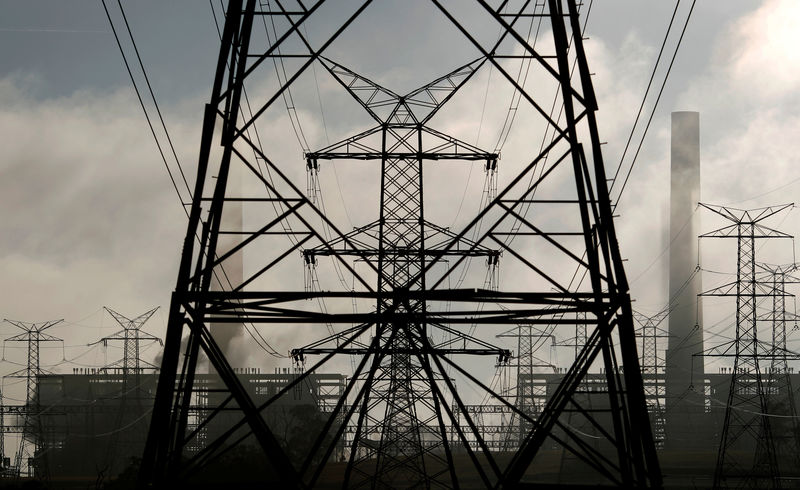By Sonali Paul and James Regan
MELBOURNE/SYDNEY (Reuters) - Some of Australia's biggest power users, including mining giant BHP, are taking steps to curb the impact of any repeat of crippling blackouts that hit last summer, worried about a grid that increasingly relies on wind power and old coal-fired plants.
Their back-up strategies come despite assurances from the nation's energy market operator that it has lined up enough power reserves - including the world's biggest lithium ion battery, set up by Tesla Inc (O:TSLA) - to get through all but the most unexpected conditions.
Australia's summer, which starts on Friday, is forecast to be hotter-than-normal in the nation's southeast, already helping double wholesale power prices in the wind-dependent state of South Australia to almost A$170 ($129) per megawatt hour (MWh)
That raises the spectre of a repeat of outages that hit South Australia and New South Wales last February if households crank up air conditioners at the same time as the wind dies down or extreme heat knocks out an ageing coal-fired plant.
The threat has prompted top global miner BHP Billiton (AX:BHP) (L:BLT) to install 30 megawatts of diesel generation at its Olympic Dam copper mine in South Australia, which was forced to close for two weeks last year after a state-wide blackout that cost it $105 million.
"That doesn't give us the ability to operate at normal levels. It's really just insurance to prevent any asset damage," Olympic Dam president Jacqui McGill told reporters this week.
Meanwhile, Alcoa (N:AA), which runs the Portland aluminium smelter in Victoria, is taking a different tack, offering to curb its power use for a fee for up to an hour during peak-demand, said spokeswoman Jodie Read.
The company's Portland smelter has recently returned to operating at about 300,000 tonnes a year since suffering a near-fatal power failure.
Elsewhere, the Tomago aluminium smelter in New South Wales would be vulnerable if it faced a prolonged heat wave at the same time as Victoria and South Australia.
"If the power goes off for any more than three hours, our potlines will freeze and they cannot be unfrozen. It's a catastrophic loss," said Matthew Howell, chief executive of Tomago Aluminium, owned by Rio Tinto (AX:RIO) (L:RIO), CSR (AX:CSR) and Norsk Hydro (OL:NHY).
Unlike Alcoa, Tomago has offered to turn off its potlines, used to make aluminium, only if the market operator is facing a state-wide blackout.
"You want to interrupt load to a potline as a last resort. You don't want to do it as a playing-an-arbitrage-with-your-energy-supplier," Howell told Reuters.
This comes as Audrey Zibelman, chief executive of the Australian Energy Market Operator, says blackouts are a "very, very, very low probability event", given steps such as coaxing gas-fired plants out of retirement, the launch of the Tesla battery on Friday in South Australia and a A$70 million ($53 million) programme to pay some power users to curb their demand.
An independent analyst said that there was less chance of blackouts this year, though he added that the risk remained.
"I don't know what the odds are of a three-hour blackout in New South Wales this summer, but it's certainly not zero," said David Leitch, an energy analyst at ITK Services Australia.
"But my bottom line is that over the last few months I've become more convinced it's less likely to occur than previously."

(The story is refiled to drop 'Inc' from Alcoa company name in paragraph eight.)